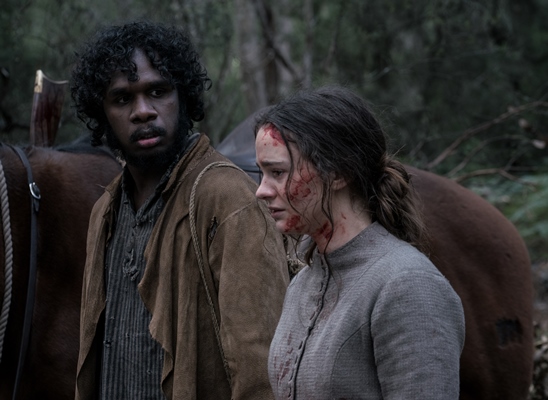Australian actress turned director Jennifer Kent’s bracing and blunt second feature film is a return to the fundamentals of filmmaking. Through the brisk, propulsive script and economic editing, she and editor Simon Njoo seamlessly build suspense one shock at a time, beginning with the alarming and excruciating prologue involving the main character’s humiliation.
Inspired by historical events, the result is a resonant film that doesn’t need a musical score to guide viewers from one emotional beat to another. Music only comes in toward the end, except for the ballads beautifully sung by Clare (Aisling Franciosi, in one of the best performances of the year), who is given the titular nickname by a ragtag, coarse colonial British regiment.
Atmospheric and somber throughout, most of the tale takes place under gray, overcast skies; it’s often so cold viewers can often see the actors’ breath. (The sun doesn’t make an appearance until the conclusion.) In 1820s Tasmania, Clare, a 21-year-old Irish convict, has completed her seven-year sentence as an indentured servant to Lieutenant Hawkins (Sam Claflin). During that time, she has married an Irish convict, Aidan (Michael Sheasby), who has recently won his freedom, and they now have a baby daughter. However, the lieutenant refuses to grant her freedom; he considers her his property. Regarding the rest of the summary, the distributor has asked critics not to reveal what happens next.
Suffice it to say, the more Clare and Aidan press their case, the more Hawkins retaliates, which leads to Clare pursuing Hawkins on horseback after he, along with some of his officers, leaves the barracks on foot to assume a captaincy on the other side of the island. She enlists the indispensable aid of a young Aboriginal tracker, Billy (Baykali Ganambarr in a strong debut), to lead her through the forested, mountainous country. However, he only agrees to her demands because of the money. He has seen his own family murdered by the British, and by going on the trek, he would also return to his homeland and be reunited with his mother and aunts.
Clare and Billy’s relationship begins as strictly transactional, and for the first few days, she walks behind Billy with a rifle pointed at his back. Even though she centers the story, the narrative is not told at Billy’s expense. By the end of the journey, he wants revenge, too, and any doubt that this isn’t his story as well is quelled by the midway point, as the focus steadily becomes diffused between the two vigilantes.
According to the publicity materials, Kent “wanted to tell a story about violence,” and indeed, she does. The notes also issued a warning that the movie “features potentially triggering acts of sexual violence towards women, violence towards children, and violence motivated by racism.” If Kent’s first film, The Babadook (2014), had a sinister undercurrent, her new and more multifaceted film unleashes it in full force. Her tale of revenge holds back nothing and is as unforgiving as, well, Clint Eastwood’s Unforgiven (1992).
Her intimate drama also revisits Australian history with a direct and expansive approach similar to other Australian films, most notably Phillip Noyce’s Rabbit-Proof Fence (2002) and Warwick Thornton’s ironically named Sweet Country (2017). These moving films also scrutinize the treatment of the Aboriginal population by white settlers. Here, the founding of the British-controlled continent is depicted as an all-out war by the Europeans encroaching upon Aboriginal lands—nothing short of genocide. (Don’t expect this tough take on history to air on Australia Day, which commemorates the first arrival in 1788 of deported British criminals in what is now Sydney.)
Claflin, as Lieutenant Hawkins, has the looks of a dashing military officer of the Regency period, straight out of a Jane Austen novel, and his layered character certainly feels entitled. Hawkins’s sense of shame regarding his own actions only makes him more defensive and cruel; he and others under his command are compelled to wipe out anyone or anything that could remind them of their culpability.
Yet no matter how tightly Kent has wound the story line, it begins to sag and fray a bit around the 110-minute mark, as though it doesn’t know quite when or how to end. There is at least one faux climax. As a result, the buildup during the previous two hours dissipates, and what was once taut becomes perfunctory. The final act is the film’s weakest and less incisive.
But speaking of its violence: one sequence in particular involves the killing of an individual who won’t go down easily without a fight, and the drawn-out chaos joins the ranks of the butchery in Alfred Hitchcock’s Torn Curtain (1966), as another example of how difficult it is to commit murder mano a mano.

















Leave A Comment